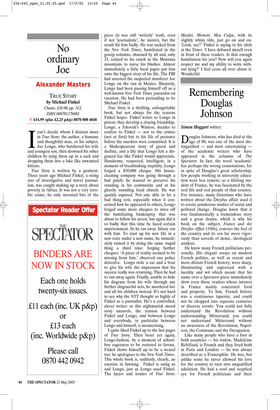No ordinary Joe
Alexander Masters
TRUE STORY by Michael Finkel Chatto, £16.99, pp. 312, ISBN 000701176881 ✆ £14.99 (plus £2.25 p&p) 0870 800 4848 Ican’t decide whom I distrust more in True Story: the author, a humane and thoughtful man, or his subject, Joe Longo, who butchered his wife and youngest son, then drowned his other children by tying them up in a sack and dropping them into a lake like unwanted kittens.
True Story is written by a penitent. Three years ago Michael Finkel, a rising star of investigative and travel journalism, was caught making up a story about poverty in Africa. It was not a very terrible crime; he only invented bits of the piece (it was still ‘writerly’ truth, even if not ‘journalistic’, he insists), but the result hit him badly. He was sacked from the New York Times, humiliated in the gossip columns, shunned by all and, only 33, retired to his ranch in the Montana mountains to nurse his blushes. Almost immediately a little local paper put him onto the biggest story of his life. The FBI had arrested the suspected murderer Joe Longo on the run in Mexico. Bizarrely, Longo had been passing himself off as a well-known New York Times journalist on vacation. He had been pretending to be Michael Finkel.
True Story is a thrilling, unforgettable book, but not always for the reasons Finkel hopes. Finkel writes to Longo in prison; they develop a cloying friendship. Longo, a Jehovah’s Witness, decides to confess to Finkel — not to the crimes (not at first) but to his life of pretence before the murders were committed. It is a Shakespearean story of greed and decline, and a life that Longo felt a disgraced liar like Finkel would appreciate. Handsome, respected, intelligent, in a moment of breathtaking stupidity, Longo forged a $30,000 cheque. His housecleaning company was going through a bad patch; he wanted to preserve his standing in his community and at his ghastly sounding local church. He was quickly exposed. Not one able to let a bad thing rest, especially when it concerned how he appeared to others, Longo forged some more cheques to stave off the humiliating bankruptcy that was about to follow his arrest, but again did it so badly that this time he faced certain imprisonment. So he ran away. Idiocy ran with him. To start up his new life in a new state under a new name, he immediately ruined it by doing the same stupid thing a third time: forging further cheques. ‘A piece of reality seemed to be missing from him,’ observed one police detective. Longo stole a car and a boat to give his wife the impression that his success really was returning. Then he had to run away again. Finally, unable to hide his disgrace from his wife through any further disgraceful acts, he murdered her and all his children instead. It’s not hard to see why the NYT thought so highly of Finkel as a journalist. He’s a controlled, clever writer: as this nightmarish moral story unravels, the tension between Finkel and Longo, and between Longo and everybody, in particular between Longo and himself, is mesmerising.
I quite liked Finkel up to the last pages of True Story. Then beset yet again, Longo-fashion, by a moment of schoolboy eagerness to be restored to favour, Finkel shows himself up to be a weasel too: he apologises to the New York Times. This whole book is, suddenly, clearly, an exercise in fawning. Finkel is using us and Longo, just as Longo used Finkel. The layers and ironies of True Story: Murder, Memoir, Mea Culpa, with its slightly whiny title, just go on and on. ‘Look, see?’ Finkel is saying to his idols at the Times. ‘I have debased myself even in front of these readers. Is that enough humiliation for you? Now will you again respect me and my ability to write without lying?’ I feel cross all over about it. Wonderful.

























































 Previous page
Previous page